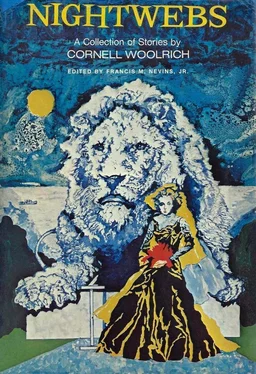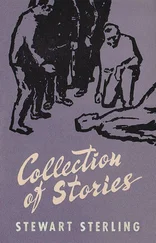A couple of the men there, detectives I guess, were standing in the doorway asking me where I found it and all about it, when suddenly she came rushing over to me, and before I could stop her grabbed up my hand and started to kiss it. “Aw, don’t, lady,” I said. “I haven’t washed ’em since I left home to go to work.”
I couldn’t get away until long after the sun came up. I kept trying to tell them I still had some deliveries to make, and all they kept saying was couldn’t they do something for me? Well, when they put it that way, why should I be bashful?
“Sure,” I said finally, “if it’s no trouble, you could let me have a couple pieces of sugar for Mamie, this part of town is off her route and she probably feels pretty strange out there.”
They all stood there looking at me like I’d said something wonderful. I don’t see anything wonderful about that, do you?
III
The Butchers and the Trapped
A call came into constabulary headquarters, at the county seat, about seven one morning. It was from Milford Junction, a local doctor named Johnson reporting the death of one Eleazar Hunt sometime during the night. Just a routine report, as required by law.
“And have you ascertained the causes?” asked the sheriff.
“Yes, I just got through examining him. I find he had burst a blood vessel — laughing too hard. Nothing out of the usual about it, but of course that’s for you to decide.”
“Well, I’ll send a man over to check.” The sheriff turned to Al Traynor, one of the members of his constabulary, who had just come in. “Drive down Milford Junction way, Al. Local resident near there, name of Eleazar Hunt, died from laughing too hard. Look things over just for the record.”
“Laughing too hard?” Traynor looked at him when he heard that. Then he shrugged. “Well, I suppose if you’ve got to go, it’s better to go laughing than crying.”
He returned to his car and started off for Milford Junction. It was about three quarters of an hour’s drive by the new State highway that had been completed only two or three years before, although the hamlet itself wasn’t directly on this, had to be reached by a dirt feeder road that branched off it. The Hunt place was about half a mile on the other side of it, near a point where the highway curved back again to rejoin the short cut, cutting a corner off the late Mr. Hunt’s acreage.
The white painted farmhouse with its green shutters gleamed dazzlingly in the early morning sunshine. Peach trees, bursting into bloom before it, hid the roof and cast blue shade on the ground. A wire fence at the back enclosed a poultry yard, and beyond that were hen houses, a stall from which a black and white cow looked plaintively forth, a toolshed, a roofed well, a vegetable garden. It was an infinitely pleasant-looking little property, and if death had struck there at all, there was no outward sign.
There was a coupé standing in the road before the house, belonging to the doctor who had reported the death, presumably. Traynor coasted up behind it, braked, got out, and went in through the gate. He had to crouch to pass under some of the low hanging peach boughs. There was a cat sunning itself on the lower doorstep. He reached down to tickle it and a man came around the corner of the house just then, stood looking at him.
He was sunburned, husky, and about thirty. He wore overalls and was carrying an empty millet sack in his hand. Judging by the commotion audible at the back, he had just finished feeding the poultry. His eyes were shrewd and lidded in a perpetual squint that had nothing to do with the sun.
“You the undertaker already?” he wanted to know.
“Sheriff’s office,” snapped Traynor, none too pleased at the comparison. “You work here?”
“Yep. Hired man.”
“How long?”
“‘Bout six months.”
“What’s your name?”
“Dan Fears.”
“He keep anybody else on?”
Fears answered indirectly, with a scornful gesture toward the back. “Not enough to keep one man busy as it is. Tend one cow and pick up a few eggs.”
It occurred to Traynor if there was that little to do, why hadn’t the cow been led out to pasture by now and the poultry fed earlier? He went on in, stepping high over the cat. She looked indolently upward at his heel as it passed over her.
A shaggy, slow moving man was coming toward the screen door to meet Traynor as he pushed through it with a single cursory knock at its frame. Johnson was a typical country doctor, of a type growing scarcer by the year. You could tell by looking at him that he’d never hurried or got excited in his life. You could surmise that he’d never refused a middle-of-the-night call from miles away in the dead of winter either. He was probably highly competent, in spite of his misleading rusticity.
“Hello, son.” He nodded benignly. “You from the sheriff’s office? I was just going back to my own place to make out the death certificate.”
“Can I see him?”
“Why, shore. Right in here.” The doctor parted a pair of old-fashioned sliding doors and revealed the “front parlor” of the house. Across the top of each window was stretched a valance of faded red plush, ending in a row of little plush balls. On a table stood an oil lamp — there was no electricity this far out — with a frosted glass dome and a lot of little glass prisms dangling from it.
There was an old-fashioned reclining chair with an adjustable back near the table and lamp. Just now it was tilted only slightly, at a comfortable reading position. It was partly covered over with an ordinary bed sheet, like some furniture is in summertime, only the sheet bulged in places and a clawlike hand hung down from under it, over the arm of the chair. Traynor reached down, turned back the upper edge of the sheet. It was hard not to be jolted. The face was a cartoon of frozen hilarity. It wasn’t just that death’s-head grimace that so often, because of bared teeth, faintly suggests a grin. It was the real thing. It was Laughter, permanently photographed in death. The eyes were creased into slits; you could see the dried but still faintly glistening saline traces of the tears that had overflowed their ducts down alongside his nose. The mouth was a vast upturned crescent full of yellowish horse teeth. The whole head was thrown stiffly back at an angle of uncontrollable risibility. It was uncanny only because it was so motionless, so silent, so permanent.
“You found him just like this?”
“Shore. Had to examine him, of course, but rigor had already set in, so I figger nothing I did disturbed him much.” Johnson chuckled inside himself, gave Traynor a humorously reproachful look. “Why, son, you don’t think this is one of those things? Shame on you!”
He saw that he hadn’t convinced the younger man by his raillery. “Why, I examined him thoroughly, son,” he protested gently. “I know my business as well as the next man. I tell you not a finger was laid on this man. Nothing’s happened to him but what I said. He burst a blood vessel from laughing too hard. Course, if you want me to perform a complete autopsy, send his innards and the contents of his stomach down to the State laboratory—” It was said with an air of paternal patience, as if he were humoring a headstrong boy.
“I’m not discrediting your competence, doctor. What’s this?” Traynor picked up a little booklet, lying open tent-shaped on the table. “Joe Miller’s Joke Book,” it said on the cover, and the copyright was 1892.
“That’s what he was reading. That’s what got him, I reckon. Found it lying on the floor under his right hand. Fell from his fingers at the moment of death, I guess.”
“Same page?”
Читать дальше












